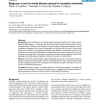Free Online Productivity Tools
i2Speak
i2Symbol
i2OCR
iTex2Img
iWeb2Print
iWeb2Shot
i2Type
iPdf2Split
iPdf2Merge
i2Bopomofo
i2Arabic
i2Style
i2Image
i2PDF
iLatex2Rtf
Sci2ools
130
Voted
SCFBM
2008
2008
Epigrass: a tool to study disease spread in complex networks
Background: The construction of complex spatial simulation models such as those used in network epidemiology, is a daunting task due to the large amount of data involved in their parameterization. Such data, which frequently resides on large geo-referenced databases, has to be processed and assigned to the various components of the model. All this just to construct the model, then it still has to be simulated and analyzed under different epidemiological scenarios. This workflow can only be achieved efficiently by computational tools that can automate most, if not all, these time-consuming tasks. In this paper, we present a simulation software, Epigrass, aimed to help designing and simulating network-epidemic models with any kind of node behavior. Results: A Network epidemiological model representing the spread of a directly transmitted disease through a bus-transportation network connecting mid-size cities in Brazil. Results show that the topological context of the starting point of t...
Related Content
| Added | 28 Dec 2010 |
| Updated | 28 Dec 2010 |
| Type | Journal |
| Year | 2008 |
| Where | SCFBM |
| Authors | Flávio C. Coelho, Oswaldo G. Cruz, Cláudia T. Codeço |
Comments (0)

